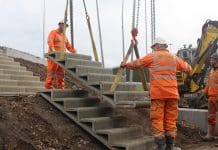Modern Methods of Construction (MMC) offer huge opportunities to deliver better buildings but realising them will require fundamental changes. Alison Nicholl, head of Constructing Excellence at BRE, discusses the need for lasting transformation
Modern methods of construction (MMC) are presenting an unrivalled opportunity for us to build sustainable, safe and affordable buildings and infrastructure of a higher quality and with greater levels of predictability. Constructing Excellence’s recent report in collaboration with Bristol Housing Festival, RLB and BRE demonstrates the tangible benefits that MMC bring and the potential for them to deliver both financial and wider societal benefits.
However, to realise these benefits we need to fundamentally rethink how we procure and deliver buildings. Antiquated and unsustainable delivery models are more broken than ever, and greater collaboration will be vital if we are to deliver positive change across the industry.
Today’s challenges
The current challenges the industry faces around material availability and price increases make solutions that provide greater predictability increasingly attractive and investible. Labour shortages, both on site and at a professional level, are the most significant cause of delay at the moment. This is leading to project delays, price increases and an even greater uncertainty. This has been the result of decades’ failure to invest in and attract talent into the construction industry. However, a combination of Brexit and the pandemic have made it more difficult to rely on established labour resources. The need to reform the construction labour model through embracing MMC, as detailed in Mark Farmer’s Modernise or Die, simply cannot be ignored.
Perhaps the greatest and most long-term challenge for construction, and indeed society, is the transition to net zero. Standard delivery models and existing ways of working cannot deliver the sustainable built environment we so desperately need to strive for. Net zero provides us with an unparalleled opportunity to fundamentally rethink our approach to construction.
Greater investment and take up of MMC will enable us to take a more controlled and predictable approach to achieving net zero. It will require all parties to work together towards that common goal, to set aside current contractual practices and established ways of working so that we are able to deliver collaborative solutions where each party is recognised for the value they bring.
As things stand, the construction industry cannot take advantage of all of these benefits. Lack of demand aggregation and standardisation are impeding the market from realising the economies of scale that will unlock the economic benefits. In our recent report, we estimated that the industry could benefit from savings of up to one-third if demand aggregation and standardisation were prioritised.
The opportunities of MMC
One of the most exciting aspects and opportunities that MMC bring is the ability to pay designers and consultants for designs which can be repeated and at scale, in turn embedding the importance of intellectual property in favour of excessive labour and resource. ACE have done significant work on this through its Future of Consultancy project and those principles are now being embraced by those at the forefront of industry transformation.
There is also a major opportunity for Tier 1 contractors to better interact with supply chains, assuming the role of a “systems integrator” to ensure that they are fully engaged in the process and all parties involved can capitalise on the knowledge that manufacturers bring to the table.
There are some fantastic examples from organisations such as Collida, which has been tasked with reformulating the end-to-end process, working collaboratively with its supply chain partners to deliver better buildings quicker, more sustainably and at a lower cost.
These approaches require long-term partnerships with specialists and manufacturers, both of which will be integral to the successful delivery of MMC. To truly deliver an integrated proposition, we’ll need to ensure that each part of the supply chain is engaged while making sure that we value the expertise and knowledge of respective parties.
In addition, the construction industry can learn so much from manufacturing, and it needs to embrace their approaches to improve collaboration and productivity. The Transforming Construction Network Plus work on Supply Chain Productivity in Construction demonstrates this, while the Construction Innovation Hub is providing many of the tools and foundations required to embrace these approaches. What’s more, Construction Quality Planning demonstrates how manufacturing quality approaches and product development can be applied in the context of the built environment.
Of course, supply chain systems can innovate and change but without a market for these innovations they will fail, and any investment will be wasted. This is where clients come in. By adapting to a new way of working with the industry, clients can help the wider industry embrace collaboration and procure on outcomes and value – proving themselves as a fundamental part of the shift to MMC.
The good news is that much of the groundwork has already been done to deliver this. Constructing Excellence has long been a champion of collaborative procurement and models such as 2 Stage Open Book and Insurance Backed Alliancing are tried and tested ways of delivering better projects. Now, they just need to be embraced at scale.
There are some excellent examples of client leadership. The Ministry of Justice used a partnering contract on HMP Five Wells to demonstrate how embracing collaborative procurement, digitalisation and MMC can deliver better buildings, quicker and more predictably. This crucially formed the blueprint for future projects with 80% repeatability, providing the supply chain with greater confidence and the ability to invest in the skills, technology and capacity to deliver this programme effectively.
Bristol Housing Festival also demonstrates how the social housing market can utilise demand aggregation to develop more effective relationships with supply chain partners and, ultimately, better outcomes for residents. They have also published their blueprint to allow other local authorities to learn from and embrace these approaches.
Call to industry
MMC have never been more relevant and they can play a major role in solving some of the big challenges construction currently faces. However, it will be up to us as an industry to drive the changes that will enable us to tackle these challenges – working collaboratively, embracing technology and learning from manufacturing. By doing so, we will be able to crucially change the commercial models that hold back transformation.
Alison Nicholl
Head of Constructing Excellence
BRE
Tel: +44 (0)3330 430 643
www.constructingexcellence.org.uk

















